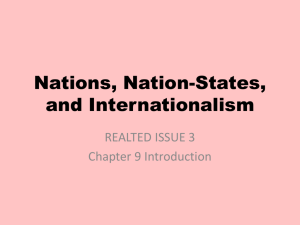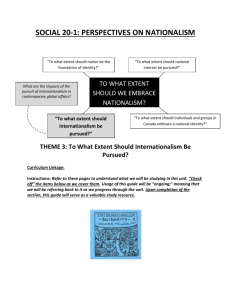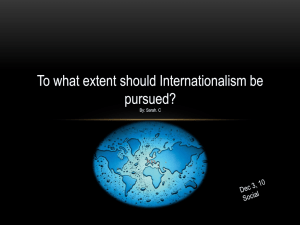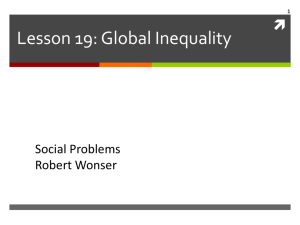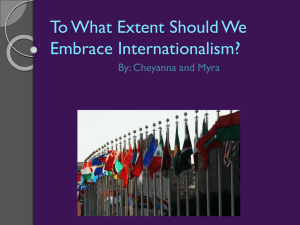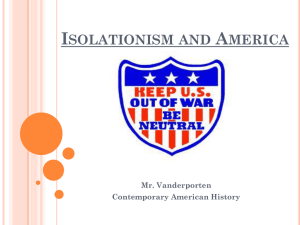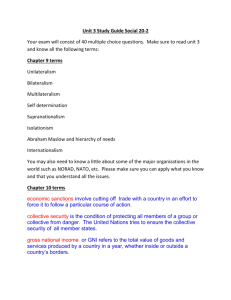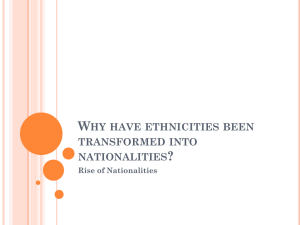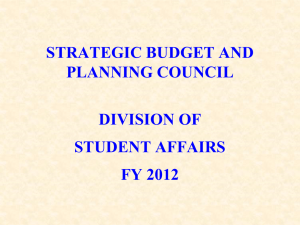Social Studies 20-2 Related Issue # 3
advertisement
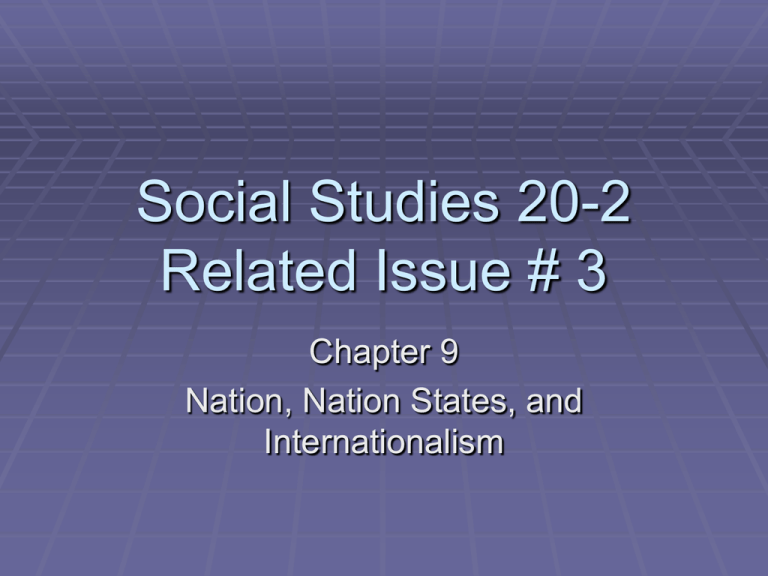
Social Studies 20-2 Related Issue # 3 Chapter 9 Nation, Nation States, and Internationalism Reviewing Related Issue #3 Review page 196, and the Unit’s contents Volunteer to read page 197 Key Terms Needs Wants Isolationism Unilateralism Bilateralism Multilateralism Supranationalism Key Concept Does involvement in international affairs benefit nations and nation-states? Read page 202 What motivates nations and nationstates to become involved in international affairs? People’s behaviours is motivated by both NEEDS and WANTS Needs – things people must have to survive ( food, water, shelter, and health ) Wants – things people desire, not necessary to survive ( cellphone, tattoo, …) Maslow’s Hierarchy of Human Needs Believed that everyone ranked her or his needs in order of importance Placed basic survival needs at the bottom People would then work their way up through the levels until they became happy and fulfilled human beings Some people believe human nature is too complex to follow this method Needs and Motives of Successful Nation-States Read page 203 Behaviour of nation-states and nations is motivated by the collective needs and wants of the country’s people Nations and Nation-states are motivated to achieve and maintain: Economic stability Peace and Security Self-determination Humanitarianism Complete Handout 3.9.4 by reading pages 203-206 Economic Stability People – may involve getting an education, finding a job and saving money Nation – might decide to provide more money for training apprentices to attract more industries to the country Nation – develop trade policies that support exports which help keep employment levels high in their country When people have jobs they spend more money. When they spend more money they create a demand for goods and services which make companies make more goods and therefore need to hire more workers Peace and Security Safety is a strong motivator for nations and nation-states Society can not function unless people feel safe doing things like attending school and going to work Nations promote safety by passing laws, creating police forces, and making rules for the workplace Nations promote security through their interaction with the rest of the world Peace and Security Avoiding war is a strong motivator Most nation-states are motivated to create alliances to protect themselves against conflict NATO – North Atlantic Treaty Organization Protective alliance among countries whose goal is to maintain security of western nations Canada is a member Peace and Security NORAD – North American Aerospace Defense Command Defends the air space of North America United Nations International body to help nations solve conflicts and problems before they escalate Case Study In 2007, these women lived in refugee camp in Darfur, a region of Sudan. In Sudan, about 2.5 million people have fled their homes because of fighting between government forces and rebels. This fighting has destroyed many people’s peace and security. What might be some long-term effects of this lack of peace and security? Self-determination Most people are highly motivated to control their own lives Nations and Nation-state are also highly motivated to control their future They achieve this goal by seeking selfdetermination Self-determination Nations that are controlled by another nation may even decide to seek sovereignty ( independence ) Example – Canada wanting it independence from Britain Example – many nations created at the end of World War One based around selfdetermination Self Determination Europe 1914 Europe 1919 Humanitarianism Motivation to help other to some extent Nations attempt to relieve suffering and protect the innocent Humanitarianism – acting to support the dignity and well-being of all people Can be both internal and external Failed States Read page 207 Countries that cannot ( or do not ) meet the needs of their citizens may be classified as “failed states”. Answer EXPLORATIONS #1 What causes states to fail: Loss of political legitimacy Corruption of government Economic decline Violent takeover of government Organized crime Not sustain essential public service Cannot promote economic growth Do not provide welfare Fear of others – ethnic conflicts Greed Botswana and Zimbabwe Read pages 208-209 EXPLORATIONS #1 How do Motives of Nations and Nation-States shape their responses to the rest of the world? Read the opening paragraph page 210 Motives shape the way governments manage their domestic ( internal ) affairs and how they respond to the world When deciding how to respond to the rest of the world, countries are influenced by many factors related to the needs of its people The range of responses include: Isolationism Unilateralism Bilateralism Multilateralism supranationalism Possible Responses to International Affairs Read the remainder of page 210 to page 213 and using the pinwheel handout, in your own words describe 5 ways in which countries can respond to international affairs. Each arm of the pinwheel should include 3 sections: 1. The name and a brief description 2. An example, either written or sketched 3. The motive(s) your example is serving Isolationism The policy of staying completely out of world affairs Have no dealings at all with other countries Complete isolationism is rare – most still have diplomatic ties with countries but stay out of any disputes Examples: Japan – isolated itself for over 200 years Switzerland – remained neutral during both World Wars United States – after World War Two Unilateralism Means going alone When a country does not want help from other countries or it is unable to persuade other countries to help them Declaring war on a country without the help of other countries is an example Examples – Cold War – USA vs USSR Fear over nuclear arms development Everyone was scared of joining sides Let the two of them fight it out – hoped it would not go nuclear Bilateralism When two countries are motivated by the same issue or need Agreements made between two countries Examples – Acid Rain agreement between Canada and the USA Multilateralism Many parties acting together as one Several countries cooperate to resolve an issue of concern to them all Is a favorite strategy of middle power countries – such as Canada Example – Kyoto Protocol– agreement among many countries to reduce the greenhouse gas emissions Multi-lateral Cooperation Why is multilateral cooperation important when it comes to environmental issues? Why might it often be difficult to achieve? Supranationalism Involves nations agreeing to go along with decisions made by international organizations Members sometime have an outside body make decisions for them Example – European Union European Union When countries join the European union they must give up some control over their own affairs In the EU, major decisions are made by a vote in which every member country casts a ballot As a result very few decisions are unanimous – but all members must abide with the majority You sometimes have to go along with policies that they do not entirely agree with European Union Benefits the national interests Most member of the EU have given up their own national money. They have adopted the euro as their common currency Sharing this currency with other countries helps bring stability to their economies and controls inflation Understandings of Internationalism Read pages 214-216 Use the handout 3.9.9 “picturing Internationalism” to respond to the Challenge on page 214. How does Internationalism benefit nations and nation-states? Read pages 218-219
